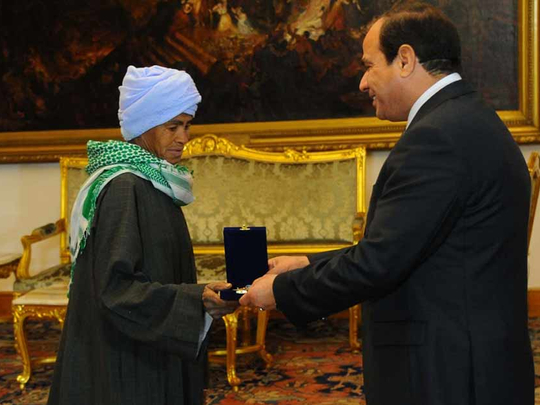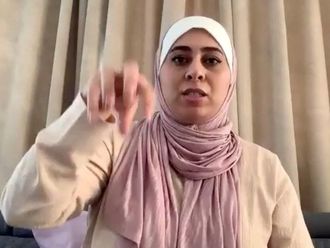
Cairo: Sisa Abu Daooh is Egypt’s matriarch of the moment, after being named by officials in her home town of Luxor as the city’s most supportive mother. Which may come as a surprise: for she is Luxor’s “best mum” by virtue of having worked and dressed for more than 40 years as a man.
Abu Daooh, 65, met Egypt’s president, Abdul Fattah Al Sissi , on Sunday to receive an award. She said she was not going to stop living as a man.
“I have decided to die in these clothes. I’ve got used to it. It’s my whole life and I can’t leave it now.”
It was a life she began in the 1970s when her husband died. She was six months pregnant with their first child. These days, at least one in seven Egyptian breadwinners is a woman, but 40 years ago, her conservative family did not consider it appropriate for her to work.
“My brothers wanted me to get married again,” she says. “All the time they kept bringing new grooms to me.” The suitors weren’t for her. But according to her siblings, neither was a working life: labouring jobs were closed to women, and she lacked the education for an office job.
So to the fury of her family, Abu Daooh chose another way of finding employment: she took on a male identity. She shaved her head, wore loose-fitting male robes and made bricks and harvested wheat. Initially as “strong as 10 men”, by her account, she later took to shoe-shining once her strength began to fade.
“When a woman lets go of her femininity, it’s hard,” she said. “But I would do anything for my daughter. It was the only way to make money. What else could I do? I can’t read or write, my family didn’t send me to school, so this was the only way.”
She grew to enjoy working as a man, she said. It allowed her to go about her business without threat of rampant sexual harassment, and to perform roles that were previously off limits. “I was happy,” she said. “I was able to work men’s work, and all the people around me were happy with it. When men looked at me they looked at me as a man.”
All this meant she could also socialise as man, noted Mena Melad, the editor-owner of the Luxor Times. “She’d sit in the coffee shop with the men, and passers-by wouldn’t notice. She was one of them.” Many people realised she was female, calling her Umm Hoda, or Hoda’s mum - a common form of address in the Middle East.
“I never hid it,” she remembers. “I wasn’t trying to keep it a secret.” Gradually her renown grew, to the extent that she now claims “the whole city of Luxor knows I’m a woman, from the smallest kid to the biggest man”.
Eventually, this fame paid dividends. This year, the local government in Luxor named her the city’s most devoted mum - documented on a certificate she cannot read - and gave her a kiosk to help support her income.
Even now she has a family to support; her daughter’s husband cannot work through illness, so she helps put food on the table for the grandchildren. As gruelling as this makes her life, she would not want to see Hoda make the same sacrifice she did more than four decades ago. “Of course not,” says Abu Daooh. “She has a husband and kids.”











